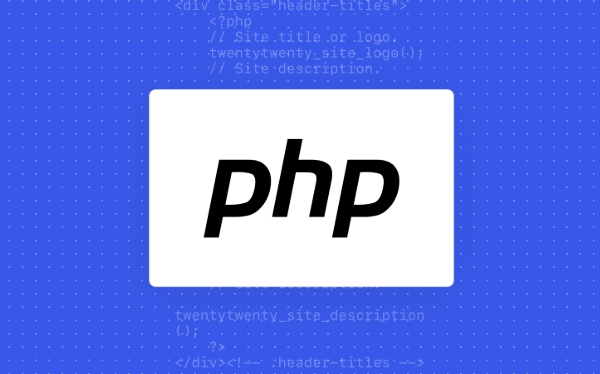 Backend Development
Backend Development
 PHP Tutorial
PHP Tutorial
 Architecting for Testability: Isolating Superglobals in Modern PHP Applications
Architecting for Testability: Isolating Superglobals in Modern PHP Applications
Architecting for Testability: Isolating Superglobals in Modern PHP Applications
Aug 04, 2025 am 06:28 AMTo improve the testability of PHP applications, it is necessary to isolate the direct use of hyperglobal variables, because hyperglobal variables such as $_GET, $_POST, $_SESSION, etc. belong to the global state, which will cause code-coupled environments, difficult to simulate inputs, and state leakage between tests; 1. Use standard request objects such as PSR-7 or Symfony HttpFoundation to encapsulate input data at the entrance to avoid business logic directly accessing hyperglobal variables; 2. Define interfaces (such as SessionInterface) for sessions and cookie operations and dependency injection to facilitate replacement with simulated implementation during testing; 3. Encapsulate environmental data such as $_SERVER in a dedicated class, and access them through object methods to ensure that they can be controlled by the test environment; 4. Always simulate input in tests rather than modifying global variables; by abstracting hyperglobal variables, the code will be clearer, measurable, and maintainable, ultimately realizing truly decoupled unit testing.

When building modern PHP applications, testability should be a first-class concern. One of the biggest obstacles to writing clean, reliable, and fast unit tests is the uncontrolled use of superglobals like $_GET , $_POST , $_SERVER , $_SESSION , and $_COOKIE . These are global variables that are implicitly available across your codebase, making them hard to mock, predict, and isolate During testing. To truly architect for testing, we need to isolate and abstract access to superglobals.

Why Superglobals Break Testability
Superglobals are essentially global state. When your business logic directly reads from $_POST or checks $_SERVER['HTTP_USER_AGENT'] , you're tightly coupling your code to the execution environment. This creates several testing problems:
- You can't easily simulate different inputs without manipulating global scope, which is fragile and can leak between tests.
- Tests becomes slow and complex , often requiring bootstrapping the entire request lifecycle.
- Code becomes less reusable and harder to reason about, since dependencies are hidden.
For example, consider this common anti-pattern:

function processLogin() {
$username = $_POST['username'] ?? '';
$password = $_POST['password'] ?? '';
// validation and login logic...
} Testing this function requires either populating $_POST directly (which affects global state) or rewriting the logic. Neither is ideal.
Abstract Superglobals Behind Interfaces
The solution is to encapsulate access to superglobals behind dedicated, injectable abstractions. In modern PHP, this typically means creating or using a Request object that captures all input data at the entry point of your application (eg, in a front controller or middleware layer).

The most common and effective approach is to use PSR-7 or Symfony's HttpFoundation to represent the request. These provide a clean, testable interface for accessing input data.
For example, using PSR-7:
use Psr\Http\Message\ServerRequestInterface;
class LoginHandler
{
public function __invoke(ServerRequestInterface $request)
{
$data = $request->getParsedBody();
$username = $data['username'] ?? '';
$password = $data['password'] ?? '';
// process login...
}
}Now, in your tests, you can easily mock or build a request with any data:
public function testLoginRequiresUsername()
{
$request = (new ServerRequest())->withParsedBody([
'username' => '',
'password' => 'secret'
]);
$handler = new LoginHandler();
$response = $handler($request);
$this->assertHasError($response, 'username', 'required');
}No global state, no side effects—just pure, isolated input.
Isolate Session and Cookie Access Too
Superglobals like $_SESSION and $_COOKIE need similar treatment. Instead of writing directly to $_SESSION['user'] , wrap session interaction in a service:
interface SessionInterface
{
public function set(string $key, mixed $value);
public function get(string $key): mixed;
public function has(string $key): bool;
}
class PhpSession implements SessionInterface
{
public function __construct()
{
if (session_status() === PHP_SESSION_NONE) {
session_start();
}
}
public function set(string $key, mixed $value): void
{
$_SESSION[$key] = $value;
}
public function get(string $key): mixed
{
return $_SESSION[$key] ?? null;
}
public function has(string $key): bool
{
return isset($_SESSION[$key]);
}
} Now your code depends on an interface, not $_SESSION . During testing, you can swap in a mock or in-memory session:
$session = $this->createMock(SessionInterface::class); $session->method('get')->with('user_id')->willReturn(123);
This makes authentication logic or user state handling fully testable without starting a real session.
Extract Server and Environment Data Early
Data from $_SERVER (like request method, URI, headers) should also be captured at the application boundary. PSR-7 ServerRequest does this automatically via server parameter injection. But if you're not using a full HTTP message stack, at least wrap $_SERVER access:
class ServerData
{
private array $data;
public function __construct(array $server = null)
{
$this->data = $server ?? $_SERVER;
}
public function getMethod(): string
{
return $this->data['REQUEST_METHOD'] ?? 'GET';
}
public function getUri(): string
{
return $this->data['REQUEST_URI'] ?? '/';
}
public function getHeader(string $name): ?string
{
return $this->data["HTTP_" . strtoupper(str_replace('-', '_', $name))] ?? null;
}
} Injecting this object instead of reading $_SERVER directly allows you to simulate different environments in tests.
Best Practices Summary
To isolate superglobals effectively:
- Never access
$_GET,$_POST,$_SESSION, etc., directly in business logic. - Capture request data at the entry point and pass it through objects.
- Use PSR-7 or HttpFoundation where possible—they're battle-tested and widely supported.
- Depend on interfaces , not superglobals or concrete globals.
- Mock input in tests —don't rely on global state manipulation.
By treating superglobals as environmental concerns to be abstracted, not as convenient data sources, you make your application more maintained, secure, and testable.
Basically, if your code doesn't know $_POST exists, your tests will thank you.
The above is the detailed content of Architecting for Testability: Isolating Superglobals in Modern PHP Applications. For more information, please follow other related articles on the PHP Chinese website!

Hot AI Tools

Undress AI Tool
Undress images for free

Undresser.AI Undress
AI-powered app for creating realistic nude photos

AI Clothes Remover
Online AI tool for removing clothes from photos.

Clothoff.io
AI clothes remover

Video Face Swap
Swap faces in any video effortlessly with our completely free AI face swap tool!

Hot Article

Hot Tools

Notepad++7.3.1
Easy-to-use and free code editor

SublimeText3 Chinese version
Chinese version, very easy to use

Zend Studio 13.0.1
Powerful PHP integrated development environment

Dreamweaver CS6
Visual web development tools

SublimeText3 Mac version
God-level code editing software (SublimeText3)
 PHP Variable Scope Explained
Jul 17, 2025 am 04:16 AM
PHP Variable Scope Explained
Jul 17, 2025 am 04:16 AM
Common problems and solutions for PHP variable scope include: 1. The global variable cannot be accessed within the function, and it needs to be passed in using the global keyword or parameter; 2. The static variable is declared with static, and it is only initialized once and the value is maintained between multiple calls; 3. Hyperglobal variables such as $_GET and $_POST can be used directly in any scope, but you need to pay attention to safe filtering; 4. Anonymous functions need to introduce parent scope variables through the use keyword, and when modifying external variables, you need to pass a reference. Mastering these rules can help avoid errors and improve code stability.
 How to handle File Uploads securely in PHP?
Jul 08, 2025 am 02:37 AM
How to handle File Uploads securely in PHP?
Jul 08, 2025 am 02:37 AM
To safely handle PHP file uploads, you need to verify the source and type, control the file name and path, set server restrictions, and process media files twice. 1. Verify the upload source to prevent CSRF through token and detect the real MIME type through finfo_file using whitelist control; 2. Rename the file to a random string and determine the extension to store it in a non-Web directory according to the detection type; 3. PHP configuration limits the upload size and temporary directory Nginx/Apache prohibits access to the upload directory; 4. The GD library resaves the pictures to clear potential malicious data.
 Commenting Out Code in PHP
Jul 18, 2025 am 04:57 AM
Commenting Out Code in PHP
Jul 18, 2025 am 04:57 AM
There are three common methods for PHP comment code: 1. Use // or # to block one line of code, and it is recommended to use //; 2. Use /.../ to wrap code blocks with multiple lines, which cannot be nested but can be crossed; 3. Combination skills comments such as using /if(){}/ to control logic blocks, or to improve efficiency with editor shortcut keys, you should pay attention to closing symbols and avoid nesting when using them.
 How Do Generators Work in PHP?
Jul 11, 2025 am 03:12 AM
How Do Generators Work in PHP?
Jul 11, 2025 am 03:12 AM
AgeneratorinPHPisamemory-efficientwaytoiterateoverlargedatasetsbyyieldingvaluesoneatatimeinsteadofreturningthemallatonce.1.Generatorsusetheyieldkeywordtoproducevaluesondemand,reducingmemoryusage.2.Theyareusefulforhandlingbigloops,readinglargefiles,or
 Tips for Writing PHP Comments
Jul 18, 2025 am 04:51 AM
Tips for Writing PHP Comments
Jul 18, 2025 am 04:51 AM
The key to writing PHP comments is to clarify the purpose and specifications. Comments should explain "why" rather than "what was done", avoiding redundancy or too simplicity. 1. Use a unified format, such as docblock (/*/) for class and method descriptions to improve readability and tool compatibility; 2. Emphasize the reasons behind the logic, such as why JS jumps need to be output manually; 3. Add an overview description before complex code, describe the process in steps, and help understand the overall idea; 4. Use TODO and FIXME rationally to mark to-do items and problems to facilitate subsequent tracking and collaboration. Good annotations can reduce communication costs and improve code maintenance efficiency.
 Quick PHP Installation Tutorial
Jul 18, 2025 am 04:52 AM
Quick PHP Installation Tutorial
Jul 18, 2025 am 04:52 AM
ToinstallPHPquickly,useXAMPPonWindowsorHomebrewonmacOS.1.OnWindows,downloadandinstallXAMPP,selectcomponents,startApache,andplacefilesinhtdocs.2.Alternatively,manuallyinstallPHPfromphp.netandsetupaserverlikeApache.3.OnmacOS,installHomebrew,thenrun'bre
 How to access a character in a string by index in PHP
Jul 12, 2025 am 03:15 AM
How to access a character in a string by index in PHP
Jul 12, 2025 am 03:15 AM
In PHP, you can use square brackets or curly braces to obtain string specific index characters, but square brackets are recommended; the index starts from 0, and the access outside the range returns a null value and cannot be assigned a value; mb_substr is required to handle multi-byte characters. For example: $str="hello";echo$str[0]; output h; and Chinese characters such as mb_substr($str,1,1) need to obtain the correct result; in actual applications, the length of the string should be checked before looping, dynamic strings need to be verified for validity, and multilingual projects recommend using multi-byte security functions uniformly.
 Learning PHP: A Beginner's Guide
Jul 18, 2025 am 04:54 AM
Learning PHP: A Beginner's Guide
Jul 18, 2025 am 04:54 AM
TolearnPHPeffectively,startbysettingupalocalserverenvironmentusingtoolslikeXAMPPandacodeeditorlikeVSCode.1)InstallXAMPPforApache,MySQL,andPHP.2)Useacodeeditorforsyntaxsupport.3)TestyoursetupwithasimplePHPfile.Next,learnPHPbasicsincludingvariables,ech





